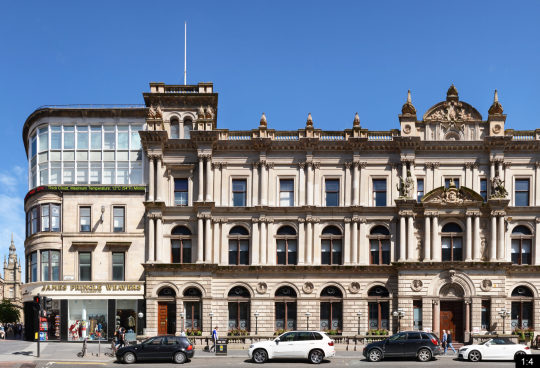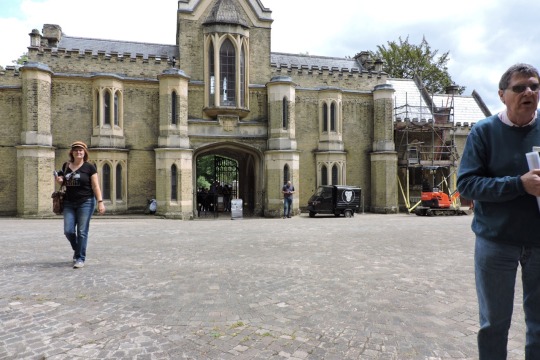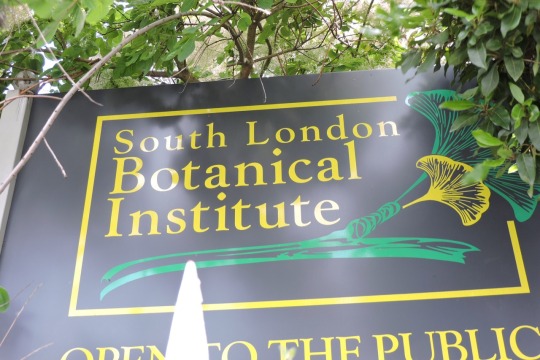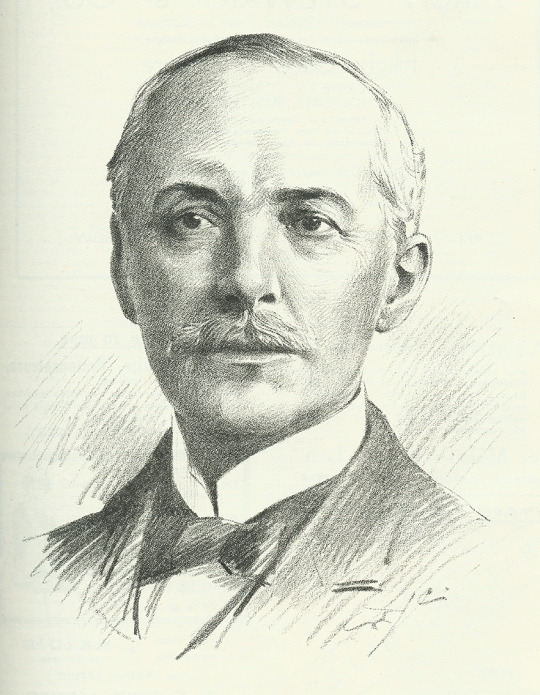#south london botanical institute
Explore tagged Tumblr posts
Text




The distinguished architect John Burnett died on July 2nd 1938 at Colinton, Edinburgh.
Burnett designed buildings the length and breadth of the British Isles and on the continent of Europe and as far afield as South Africa.
John Burnet was born a soldier's son at Craighead House, Kirk O' Shotts, and trained initially as a carpenter. After becoming a Clerk of Works, he set up as an architect specializing in modest churches and houses in the Italianate and Classical styles, and large-scale commercial buildings and hospitals in the Italian Renaissance, Baronial and Gothic styles.
One of his first undertakings in Glasgow was the Royal Institute of the Fine Arts in Sauchiehall Street, which was won by competition. Other notable buildings there are the offices of the Clyde Trust, the Athenaeum, the Botanical Department and extension of the University, the Pathological Institute, the Barony Church.
In Edinburgh he designed the Professional and Civil Service Stores, George Street, the business premises of R. W. Forsyth in Princes Street, which later housed Burtons for many years, and in Scotland and England generally many public, ecclesiastical and domestic buildings. He was also architect for the Edinburgh International Exhibition of 1906.
Important commissions came to him from London and to London he devoted the latter part of his life, the firm, of which he was senior partner, being known as Sir John Burnet, Tait & Lorne. He had the honour in 1905 of being entrusted by the Government with the important additions to the British Museum, now known as the King Edward VII. Galleries.
Among his numerous London designs are the Institute of Chemistry in Russell Square, the Kodak building in Kingsway, Adelaide House and Vigo House, and the Second Church of Christ Scientist. He was the chief architect in Palestine and Gallipoli for the Imperial War Graves Commission.
The professional esteem with which Sir John was regarded in Britain may be expressed by the words used in connection with the conferring of the Gold Medal of the Royal Institute of British Architects in 1923, ‘‘ Few architects living can compare with him either in quantity or quality of output, and fewer still may be said to have had as pervasive an influence on the work of their own time.”
In France he had received both bronze and gold medals at the Salon and was a corresponding member of the Institute of France and of the Société central des Architectes Francais. He had the same relation with the American Institute of Architects.
Knighted in 1914, Sir John was a member of both the Royal Scottish Academy and the Royal Academy. He was an Honorary LL.D., of Glasgow and Fellow of the Royal Institute of British Architects, of the Royal Society, Edinburgh, and of the Royal Society of Antiquaries.
Though he took fewer commissions personally, Burnet worked into his late seventies – he designed the famous Unilever building on London in 1933 - before he eventually retired, spending his final years at Colinton in Edinburgh. He died at home at the age of 81 on this day, 1938, he is buried at Warriston Cemetery.
Pics are the beutiful Drumsheugh Baths in Edinburgh, the old Public Library and Museum, Capbelltown and the former Clydesdale Bank Headquarters, St Vincent Place, Glasgow.
28 notes
·
View notes
Text
UK calls for “ambition” on COP29 climate finance goal but won’t talk numbers - Notice Global Internet - #GLOBAL https://www.merchant-business.com/uk-calls-for-ambition-on-cop29-climate-finance-goal-but-wont-talk-numbers/?feed_id=203437&_unique_id=66ea43645b3cb The UK’s new foreign minister, David Lammy, says Global North rhetoric on climate action must be matched by funding but stays silent on the size of a new global finance goalBritain’s new foreign minister has called on governments to set an “ambitious” new goal for climate finance to help developing countries at the COP29 UN climate summit, but declined to discuss how much it should be.In his first major speech in government, after the Labour Party won power in July, Foreign Secretary David Lammy told journalists, diplomats and green campaigners at London’s Kew botanical gardens that, at COP29, the UK will “push for the ambition needed to keep 1.5 alive”. That refers to a global warming limit of 1.5 degrees Celsius agreed by governments, which is set to be exceeded unless climate action is ramped up dramatically.However, when asked by Climate Home, Lammy declined to say how high the UK government thinks the new global finance goal should be – or when it will put forward its proposal. “I can’t make announcements here because if I did, I’d go back to a storm with [UK finance minister] Rachel Reeves,” he said.[embed]https://www.youtube.com/watch?v=FPXUz4I05LY[/embed]The new collective quantified goal (NCQG) will determine how much finance should be mobilised for developing countries each year starting from 2025. It is the main outcome expected from COP29 in Baku in November. The current goal of $100 billion per year is widely viewed as inadequate and was only met two years late in 2022.Developing-country negotiators have complained that rich nations are refusing to discuss the size (or quantum) of the NCQG. Developed countries have instead pushed to expand the list of contributors to the goal to include wealthier, higher-emitting developing countries like China and Saudi Arabia.Developing-country “frustration”“It’s been frustrating for most of the developing-country negotiators,” Kenyan climate finance negotiator Julius Mbatia told journalists on Monday. He accused developed countries of trying to “dodge” their mandates and responsibilities and “avoid committing to a scale that they are actually not committed to deliver politically”. “It’s a tactic,” Mbatia said. “Unfortunately, it’s being played at the worst moment when we are talking about meeting the needs and priorities of vulnerable countries.”Melanie Robinson, global climate director at the World Resources Institute, said on Tuesday the context has changed since the current finance goal was set 15 years ago, as the impacts of climate change have worsened. All countries now need to get onto a net-zero, climate-resilient economic development pathway that benefits everyone and restores nature, she said.“We know just how huge that challenge is for all countries,” she added. “But while developed countries and China can probably find the finance to make that transition themselves, we know that developing countries will need international finance.”Slow progress in Baku risks derailing talks on new climate finance goal at COP29Asked about developing countries’ frustrations, Lammy said: “I recognise the disjunct between rhetoric sometimes in the Global North and the real pressing needs that exist in the Global South as they look to see is that rhetoric going to be actually matched with funds.”He said his government would deliver on the promise made by the former UK government to provide £11.6bn ($14.7bn) in climate finance between 2021 and 2026, despite inheriting from the Conservatives a £22bn ($29bn) “black hole” in Britain’s annual budget and a “tough fiscal environment”.The previous government cut the UK’s overseas aid target from 0.7% to 0.5% of gross national income. The new one has repeated the Conservatives’ pledge to reverse this when “fiscal circumstances allow”.
Lammy said on Tuesday he wants to restore it “as quickly as possible, and of course that’s a discussion that I’m continuing to have with colleagues in the [finance ministry]”.He added that the UK government will propose to Parliament a guarantee for the Asian Development Bank which will “unlock $1.2 billion in climate finance for developing countries in the region”. He repeated the previous government’s support for a capital increase for the International Bank for Reconstruction and Development “subject to reforms”.Clean Power AllianceIn addition, Lammy announced that the UK will appoint two new envoys for climate and nature, reporting to climate minister Ed Miliband and environment minister Steve Reed respectively. It will also launch a Clean Power Alliance that aims to help countries leapfrog fossil fuels and transition to energy systems based on clean power. The UK itself aims to get all its electricity from clean sources by 2030.“Of course, there are different obstacles from different countries but, despite several other valuable initiatives pushing forward the energy transition, there is no equivalent grouping of countries at the vanguard of the transition,” Lammy said.He added that the alliance would “focus on diversifying the production and supply of copper, cobalt, lithium and nickel – the lifeblood of the new economy”. These minerals are key to the global energy transition because they are needed for things like electric cables and batteries – and their processing is largely dominated by China, something that is a concern for Western politicians.Lammy stressed the need to “bring these commodities to market faster while avoiding the mistakes of the past”, and said the UK would help developing countries “secure economic benefits while promoting the highest environmental standards for mineral extraction”.Human rights must be “at the core” of mining for transition minerals, UN panel saysClimate Home has reported on how mining of these minerals has hurt local communities in Indonesia and Argentina – and may fail to bring fair benefits to local communities in Zimbabwe. A United Nations panel said last week that supply chains for critical minerals should not harm the local environment or human rights.Lammy said the UK would restore its international credibility on climate action – after perceived indifference from former Conservative prime minister, Rishi Sunak – by ending new licenses for oil and gas production and overturning an effective ban on onshore wind power.“We’re bringing an end to our climate diplomacy of being ‘do as I say, not as I do’,” he said.(Reporting by Joe Lo; editing by Megan Rowling)“The UK’s new foreign minister, David Lammy, says Global North rhetoric on climate action must be matched by funding but stays silent on the size of a new global finance…”Source Link: https://www.climatechangenews.com/2024/09/17/uk-calls-for-ambition-on-cop29-climate-finance-goal-but-wont-talk-numbers/ http://109.70.148.72/~merchant29/6network/wp-content/uploads/2024/09/g269557b2e777c0dcf8be44f1e74adb7141cef1a99608de1845acede8bc69ea0ba10f0de03d1273a5a3af5cad9c11b68bdfb.jpeg BLOGGER - #GLOBAL
0 notes
Text
UK calls for “ambition” on COP29 climate finance goal but won’t talk numbers - Notice Global Internet https://www.merchant-business.com/uk-calls-for-ambition-on-cop29-climate-finance-goal-but-wont-talk-numbers/?feed_id=203438&_unique_id=66ea43654174a #GLOBAL - BLOGGER BLOGGER The UK’s new foreign minister, David Lammy, says Global North rhetoric on climate action must be matched by funding but stays silent on the size of a new global finance goalBritain’s new foreign minister has called on governments to set an “ambitious” new goal for climate finance to help developing countries at the COP29 UN climate summit, but declined to discuss how much it should be.In his first major speech in government, after the Labour Party won power in July, Foreign Secretary David Lammy told journalists, diplomats and green campaigners at London’s Kew botanical gardens that, at COP29, the UK will “push for the ambition needed to keep 1.5 alive”. That refers to a global warming limit of 1.5 degrees Celsius agreed by governments, which is set to be exceeded unless climate action is ramped up dramatically.However, when asked by Climate Home, Lammy declined to say how high the UK government thinks the new global finance goal should be – or when it will put forward its proposal. “I can’t make announcements here because if I did, I’d go back to a storm with [UK finance minister] Rachel Reeves,” he said.[embed]https://www.youtube.com/watch?v=FPXUz4I05LY[/embed]The new collective quantified goal (NCQG) will determine how much finance should be mobilised for developing countries each year starting from 2025. It is the main outcome expected from COP29 in Baku in November. The current goal of $100 billion per year is widely viewed as inadequate and was only met two years late in 2022.Developing-country negotiators have complained that rich nations are refusing to discuss the size (or quantum) of the NCQG. Developed countries have instead pushed to expand the list of contributors to the goal to include wealthier, higher-emitting developing countries like China and Saudi Arabia.Developing-country “frustration”“It’s been frustrating for most of the developing-country negotiators,” Kenyan climate finance negotiator Julius Mbatia told journalists on Monday. He accused developed countries of trying to “dodge” their mandates and responsibilities and “avoid committing to a scale that they are actually not committed to deliver politically”. “It’s a tactic,” Mbatia said. “Unfortunately, it’s being played at the worst moment when we are talking about meeting the needs and priorities of vulnerable countries.”Melanie Robinson, global climate director at the World Resources Institute, said on Tuesday the context has changed since the current finance goal was set 15 years ago, as the impacts of climate change have worsened. All countries now need to get onto a net-zero, climate-resilient economic development pathway that benefits everyone and restores nature, she said.“We know just how huge that challenge is for all countries,” she added. “But while developed countries and China can probably find the finance to make that transition themselves, we know that developing countries will need international finance.”Slow progress in Baku risks derailing talks on new climate finance goal at COP29Asked about developing countries’ frustrations, Lammy said: “I recognise the disjunct between rhetoric sometimes in the Global North and the real pressing needs that exist in the Global South as they look to see is that rhetoric going to be actually matched with funds.”He said his government would deliver on the promise made by the former UK government to provide £11.6bn ($14.7bn) in climate finance between 2021 and 2026, despite inheriting from the Conservatives a £22bn ($29bn) “black hole” in Britain’s annual budget and a “tough fiscal environment”.The previous government cut the UK’s overseas aid target from 0.7% to 0.5% of gross national income. The new one has repeated the Conservatives’ pledge to reverse this when “fiscal circumstances allow”.
Lammy said on Tuesday he wants to restore it “as quickly as possible, and of course that’s a discussion that I’m continuing to have with colleagues in the [finance ministry]”.He added that the UK government will propose to Parliament a guarantee for the Asian Development Bank which will “unlock $1.2 billion in climate finance for developing countries in the region”. He repeated the previous government’s support for a capital increase for the International Bank for Reconstruction and Development “subject to reforms”.Clean Power AllianceIn addition, Lammy announced that the UK will appoint two new envoys for climate and nature, reporting to climate minister Ed Miliband and environment minister Steve Reed respectively. It will also launch a Clean Power Alliance that aims to help countries leapfrog fossil fuels and transition to energy systems based on clean power. The UK itself aims to get all its electricity from clean sources by 2030.“Of course, there are different obstacles from different countries but, despite several other valuable initiatives pushing forward the energy transition, there is no equivalent grouping of countries at the vanguard of the transition,” Lammy said.He added that the alliance would “focus on diversifying the production and supply of copper, cobalt, lithium and nickel – the lifeblood of the new economy”. These minerals are key to the global energy transition because they are needed for things like electric cables and batteries – and their processing is largely dominated by China, something that is a concern for Western politicians.Lammy stressed the need to “bring these commodities to market faster while avoiding the mistakes of the past”, and said the UK would help developing countries “secure economic benefits while promoting the highest environmental standards for mineral extraction”.Human rights must be “at the core” of mining for transition minerals, UN panel saysClimate Home has reported on how mining of these minerals has hurt local communities in Indonesia and Argentina – and may fail to bring fair benefits to local communities in Zimbabwe. A United Nations panel said last week that supply chains for critical minerals should not harm the local environment or human rights.Lammy said the UK would restore its international credibility on climate action – after perceived indifference from former Conservative prime minister, Rishi Sunak – by ending new licenses for oil and gas production and overturning an effective ban on onshore wind power.“We’re bringing an end to our climate diplomacy of being ‘do as I say, not as I do’,” he said.(Reporting by Joe Lo; editing by Megan Rowling)“The UK’s new foreign minister, David Lammy, says Global North rhetoric on climate action must be matched by funding but stays silent on the size of a new global finance…”Source Link: https://www.climatechangenews.com/2024/09/17/uk-calls-for-ambition-on-cop29-climate-finance-goal-but-wont-talk-numbers/ http://109.70.148.72/~merchant29/6network/wp-content/uploads/2024/09/g269557b2e777c0dcf8be44f1e74adb7141cef1a99608de1845acede8bc69ea0ba10f0de03d1273a5a3af5cad9c11b68bdfb.jpeg The UK’s new foreign minister, David Lammy, says Global North rhetoric on climate action must be matched by funding but stays silent on the size of a new global finance goal Britain’s new foreign minister has called on governments to set an “ambitious” new goal for climate finance to help developing countries at the COP29 … Read More
0 notes
Text
UK calls for “ambition” on COP29 climate finance goal but won’t talk numbers - Notice Global Internet - BLOGGER https://www.merchant-business.com/uk-calls-for-ambition-on-cop29-climate-finance-goal-but-wont-talk-numbers/?feed_id=203436&_unique_id=66ea4362dfc4a The UK’s new foreign minister, David Lammy, says Global North rhetoric on climate action must be matched by funding but stays silent on the size of a new global finance goalBritain’s new foreign minister has called on governments to set an “ambitious” new goal for climate finance to help developing countries at the COP29 UN climate summit, but declined to discuss how much it should be.In his first major speech in government, after the Labour Party won power in July, Foreign Secretary David Lammy told journalists, diplomats and green campaigners at London’s Kew botanical gardens that, at COP29, the UK will “push for the ambition needed to keep 1.5 alive”. That refers to a global warming limit of 1.5 degrees Celsius agreed by governments, which is set to be exceeded unless climate action is ramped up dramatically.However, when asked by Climate Home, Lammy declined to say how high the UK government thinks the new global finance goal should be – or when it will put forward its proposal. “I can’t make announcements here because if I did, I’d go back to a storm with [UK finance minister] Rachel Reeves,” he said.[embed]https://www.youtube.com/watch?v=FPXUz4I05LY[/embed]The new collective quantified goal (NCQG) will determine how much finance should be mobilised for developing countries each year starting from 2025. It is the main outcome expected from COP29 in Baku in November. The current goal of $100 billion per year is widely viewed as inadequate and was only met two years late in 2022.Developing-country negotiators have complained that rich nations are refusing to discuss the size (or quantum) of the NCQG. Developed countries have instead pushed to expand the list of contributors to the goal to include wealthier, higher-emitting developing countries like China and Saudi Arabia.Developing-country “frustration”“It’s been frustrating for most of the developing-country negotiators,” Kenyan climate finance negotiator Julius Mbatia told journalists on Monday. He accused developed countries of trying to “dodge” their mandates and responsibilities and “avoid committing to a scale that they are actually not committed to deliver politically”. “It’s a tactic,” Mbatia said. “Unfortunately, it’s being played at the worst moment when we are talking about meeting the needs and priorities of vulnerable countries.”Melanie Robinson, global climate director at the World Resources Institute, said on Tuesday the context has changed since the current finance goal was set 15 years ago, as the impacts of climate change have worsened. All countries now need to get onto a net-zero, climate-resilient economic development pathway that benefits everyone and restores nature, she said.“We know just how huge that challenge is for all countries,” she added. “But while developed countries and China can probably find the finance to make that transition themselves, we know that developing countries will need international finance.”Slow progress in Baku risks derailing talks on new climate finance goal at COP29Asked about developing countries’ frustrations, Lammy said: “I recognise the disjunct between rhetoric sometimes in the Global North and the real pressing needs that exist in the Global South as they look to see is that rhetoric going to be actually matched with funds.”He said his government would deliver on the promise made by the former UK government to provide £11.6bn ($14.7bn) in climate finance between 2021 and 2026, despite inheriting from the Conservatives a £22bn ($29bn) “black hole” in Britain’s annual budget and a “tough fiscal environment”.The previous government cut the UK’s overseas aid target from 0.7% to 0.5% of gross national income. The new one has repeated the Conservatives’ pledge to reverse this when “fiscal circumstances allow”.
Lammy said on Tuesday he wants to restore it “as quickly as possible, and of course that’s a discussion that I’m continuing to have with colleagues in the [finance ministry]”.He added that the UK government will propose to Parliament a guarantee for the Asian Development Bank which will “unlock $1.2 billion in climate finance for developing countries in the region”. He repeated the previous government’s support for a capital increase for the International Bank for Reconstruction and Development “subject to reforms”.Clean Power AllianceIn addition, Lammy announced that the UK will appoint two new envoys for climate and nature, reporting to climate minister Ed Miliband and environment minister Steve Reed respectively. It will also launch a Clean Power Alliance that aims to help countries leapfrog fossil fuels and transition to energy systems based on clean power. The UK itself aims to get all its electricity from clean sources by 2030.“Of course, there are different obstacles from different countries but, despite several other valuable initiatives pushing forward the energy transition, there is no equivalent grouping of countries at the vanguard of the transition,” Lammy said.He added that the alliance would “focus on diversifying the production and supply of copper, cobalt, lithium and nickel – the lifeblood of the new economy”. These minerals are key to the global energy transition because they are needed for things like electric cables and batteries – and their processing is largely dominated by China, something that is a concern for Western politicians.Lammy stressed the need to “bring these commodities to market faster while avoiding the mistakes of the past”, and said the UK would help developing countries “secure economic benefits while promoting the highest environmental standards for mineral extraction”.Human rights must be “at the core” of mining for transition minerals, UN panel saysClimate Home has reported on how mining of these minerals has hurt local communities in Indonesia and Argentina – and may fail to bring fair benefits to local communities in Zimbabwe. A United Nations panel said last week that supply chains for critical minerals should not harm the local environment or human rights.Lammy said the UK would restore its international credibility on climate action – after perceived indifference from former Conservative prime minister, Rishi Sunak – by ending new licenses for oil and gas production and overturning an effective ban on onshore wind power.“We’re bringing an end to our climate diplomacy of being ‘do as I say, not as I do’,” he said.(Reporting by Joe Lo; editing by Megan Rowling)“The UK’s new foreign minister, David Lammy, says Global North rhetoric on climate action must be matched by funding but stays silent on the size of a new global finance…”Source Link: https://www.climatechangenews.com/2024/09/17/uk-calls-for-ambition-on-cop29-climate-finance-goal-but-wont-talk-numbers/ http://109.70.148.72/~merchant29/6network/wp-content/uploads/2024/09/g269557b2e777c0dcf8be44f1e74adb7141cef1a99608de1845acede8bc69ea0ba10f0de03d1273a5a3af5cad9c11b68bdfb.jpeg #GLOBAL - BLOGGER The UK’s new foreign minister, Dav... BLOGGER - #GLOBAL
0 notes
Text
UK calls for “ambition” on COP29 climate finance goal but won’t talk numbers - Notice Global Internet - BLOGGER https://www.merchant-business.com/uk-calls-for-ambition-on-cop29-climate-finance-goal-but-wont-talk-numbers/?feed_id=203435&_unique_id=66ea43616d980 The UK’s new foreign minister, David Lammy, says Global North rhetoric on climate action must be matched by funding but stays silent on the size of a new global finance goalBritain’s new foreign minister has called on governments to set an “ambitious” new goal for climate finance to help developing countries at the COP29 UN climate summit, but declined to discuss how much it should be.In his first major speech in government, after the Labour Party won power in July, Foreign Secretary David Lammy told journalists, diplomats and green campaigners at London’s Kew botanical gardens that, at COP29, the UK will “push for the ambition needed to keep 1.5 alive”. That refers to a global warming limit of 1.5 degrees Celsius agreed by governments, which is set to be exceeded unless climate action is ramped up dramatically.However, when asked by Climate Home, Lammy declined to say how high the UK government thinks the new global finance goal should be – or when it will put forward its proposal. “I can’t make announcements here because if I did, I’d go back to a storm with [UK finance minister] Rachel Reeves,” he said.[embed]https://www.youtube.com/watch?v=FPXUz4I05LY[/embed]The new collective quantified goal (NCQG) will determine how much finance should be mobilised for developing countries each year starting from 2025. It is the main outcome expected from COP29 in Baku in November. The current goal of $100 billion per year is widely viewed as inadequate and was only met two years late in 2022.Developing-country negotiators have complained that rich nations are refusing to discuss the size (or quantum) of the NCQG. Developed countries have instead pushed to expand the list of contributors to the goal to include wealthier, higher-emitting developing countries like China and Saudi Arabia.Developing-country “frustration”“It’s been frustrating for most of the developing-country negotiators,” Kenyan climate finance negotiator Julius Mbatia told journalists on Monday. He accused developed countries of trying to “dodge” their mandates and responsibilities and “avoid committing to a scale that they are actually not committed to deliver politically”. “It’s a tactic,” Mbatia said. “Unfortunately, it’s being played at the worst moment when we are talking about meeting the needs and priorities of vulnerable countries.”Melanie Robinson, global climate director at the World Resources Institute, said on Tuesday the context has changed since the current finance goal was set 15 years ago, as the impacts of climate change have worsened. All countries now need to get onto a net-zero, climate-resilient economic development pathway that benefits everyone and restores nature, she said.“We know just how huge that challenge is for all countries,” she added. “But while developed countries and China can probably find the finance to make that transition themselves, we know that developing countries will need international finance.”Slow progress in Baku risks derailing talks on new climate finance goal at COP29Asked about developing countries’ frustrations, Lammy said: “I recognise the disjunct between rhetoric sometimes in the Global North and the real pressing needs that exist in the Global South as they look to see is that rhetoric going to be actually matched with funds.”He said his government would deliver on the promise made by the former UK government to provide £11.6bn ($14.7bn) in climate finance between 2021 and 2026, despite inheriting from the Conservatives a £22bn ($29bn) “black hole” in Britain’s annual budget and a “tough fiscal environment”.The previous government cut the UK’s overseas aid target from 0.7% to 0.5% of gross national income. The new one has repeated the Conservatives’ pledge to reverse this when “fiscal circumstances allow”.
Lammy said on Tuesday he wants to restore it “as quickly as possible, and of course that’s a discussion that I’m continuing to have with colleagues in the [finance ministry]”.He added that the UK government will propose to Parliament a guarantee for the Asian Development Bank which will “unlock $1.2 billion in climate finance for developing countries in the region”. He repeated the previous government’s support for a capital increase for the International Bank for Reconstruction and Development “subject to reforms”.Clean Power AllianceIn addition, Lammy announced that the UK will appoint two new envoys for climate and nature, reporting to climate minister Ed Miliband and environment minister Steve Reed respectively. It will also launch a Clean Power Alliance that aims to help countries leapfrog fossil fuels and transition to energy systems based on clean power. The UK itself aims to get all its electricity from clean sources by 2030.“Of course, there are different obstacles from different countries but, despite several other valuable initiatives pushing forward the energy transition, there is no equivalent grouping of countries at the vanguard of the transition,” Lammy said.He added that the alliance would “focus on diversifying the production and supply of copper, cobalt, lithium and nickel – the lifeblood of the new economy”. These minerals are key to the global energy transition because they are needed for things like electric cables and batteries – and their processing is largely dominated by China, something that is a concern for Western politicians.Lammy stressed the need to “bring these commodities to market faster while avoiding the mistakes of the past”, and said the UK would help developing countries “secure economic benefits while promoting the highest environmental standards for mineral extraction”.Human rights must be “at the core” of mining for transition minerals, UN panel saysClimate Home has reported on how mining of these minerals has hurt local communities in Indonesia and Argentina – and may fail to bring fair benefits to local communities in Zimbabwe. A United Nations panel said last week that supply chains for critical minerals should not harm the local environment or human rights.Lammy said the UK would restore its international credibility on climate action – after perceived indifference from former Conservative prime minister, Rishi Sunak – by ending new licenses for oil and gas production and overturning an effective ban on onshore wind power.“We’re bringing an end to our climate diplomacy of being ‘do as I say, not as I do’,” he said.(Reporting by Joe Lo; editing by Megan Rowling)“The UK’s new foreign minister, David Lammy, says Global North rhetoric on climate action must be matched by funding but stays silent on the size of a new global finance…”Source Link: https://www.climatechangenews.com/2024/09/17/uk-calls-for-ambition-on-cop29-climate-finance-goal-but-wont-talk-numbers/ http://109.70.148.72/~merchant29/6network/wp-content/uploads/2024/09/g269557b2e777c0dcf8be44f1e74adb7141cef1a99608de1845acede8bc69ea0ba10f0de03d1273a5a3af5cad9c11b68bdfb.jpeg BLOGGER - #GLOBAL The UK’s new foreign minister, David Lammy, says Global North rhetoric on climate action must be matched by funding but stays silent on the size of a new global finance goal Britain’s new foreign minister has called on governments to set an “ambitious” new goal for climate finance to help developing countries at the COP29 … Read More
0 notes
Text
UK calls for “ambition” on COP29 climate finance goal but won’t talk numbers - Notice Global Internet https://www.merchant-business.com/uk-calls-for-ambition-on-cop29-climate-finance-goal-but-wont-talk-numbers/?feed_id=203434&_unique_id=66ea424a3d8ea The UK’s new foreign minister, Dav... BLOGGER - #GLOBAL The UK’s new foreign minister, David Lammy, says Global North rhetoric on climate action must be matched by funding but stays silent on the size of a new global finance goalBritain’s new foreign minister has called on governments to set an “ambitious” new goal for climate finance to help developing countries at the COP29 UN climate summit, but declined to discuss how much it should be.In his first major speech in government, after the Labour Party won power in July, Foreign Secretary David Lammy told journalists, diplomats and green campaigners at London’s Kew botanical gardens that, at COP29, the UK will “push for the ambition needed to keep 1.5 alive”. That refers to a global warming limit of 1.5 degrees Celsius agreed by governments, which is set to be exceeded unless climate action is ramped up dramatically.However, when asked by Climate Home, Lammy declined to say how high the UK government thinks the new global finance goal should be – or when it will put forward its proposal. “I can’t make announcements here because if I did, I’d go back to a storm with [UK finance minister] Rachel Reeves,” he said.[embed]https://www.youtube.com/watch?v=FPXUz4I05LY[/embed]The new collective quantified goal (NCQG) will determine how much finance should be mobilised for developing countries each year starting from 2025. It is the main outcome expected from COP29 in Baku in November. The current goal of $100 billion per year is widely viewed as inadequate and was only met two years late in 2022.Developing-country negotiators have complained that rich nations are refusing to discuss the size (or quantum) of the NCQG. Developed countries have instead pushed to expand the list of contributors to the goal to include wealthier, higher-emitting developing countries like China and Saudi Arabia.Developing-country “frustration”“It’s been frustrating for most of the developing-country negotiators,” Kenyan climate finance negotiator Julius Mbatia told journalists on Monday. He accused developed countries of trying to “dodge” their mandates and responsibilities and “avoid committing to a scale that they are actually not committed to deliver politically”. “It’s a tactic,” Mbatia said. “Unfortunately, it’s being played at the worst moment when we are talking about meeting the needs and priorities of vulnerable countries.”Melanie Robinson, global climate director at the World Resources Institute, said on Tuesday the context has changed since the current finance goal was set 15 years ago, as the impacts of climate change have worsened. All countries now need to get onto a net-zero, climate-resilient economic development pathway that benefits everyone and restores nature, she said.“We know just how huge that challenge is for all countries,” she added. “But while developed countries and China can probably find the finance to make that transition themselves, we know that developing countries will need international finance.”Slow progress in Baku risks derailing talks on new climate finance goal at COP29Asked about developing countries’ frustrations, Lammy said: “I recognise the disjunct between rhetoric sometimes in the Global North and the real pressing needs that exist in the Global South as they look to see is that rhetoric going to be actually matched with funds.”He said his government would deliver on the promise made by the former UK government to provide £11.6bn ($14.7bn) in climate finance between 2021 and 2026, despite inheriting from the Conservatives a £22bn ($29bn) “black hole” in Britain’s annual budget and a “tough fiscal environment”.The previous government cut the UK’s overseas aid target from 0.7% to 0.5% of gross national income. The new
one has repeated the Conservatives’ pledge to reverse this when “fiscal circumstances allow”. Lammy said on Tuesday he wants to restore it “as quickly as possible, and of course that’s a discussion that I’m continuing to have with colleagues in the [finance ministry]”.He added that the UK government will propose to Parliament a guarantee for the Asian Development Bank which will “unlock $1.2 billion in climate finance for developing countries in the region”. He repeated the previous government’s support for a capital increase for the International Bank for Reconstruction and Development “subject to reforms”.Clean Power AllianceIn addition, Lammy announced that the UK will appoint two new envoys for climate and nature, reporting to climate minister Ed Miliband and environment minister Steve Reed respectively. It will also launch a Clean Power Alliance that aims to help countries leapfrog fossil fuels and transition to energy systems based on clean power. The UK itself aims to get all its electricity from clean sources by 2030.“Of course, there are different obstacles from different countries but, despite several other valuable initiatives pushing forward the energy transition, there is no equivalent grouping of countries at the vanguard of the transition,” Lammy said.He added that the alliance would “focus on diversifying the production and supply of copper, cobalt, lithium and nickel – the lifeblood of the new economy”. These minerals are key to the global energy transition because they are needed for things like electric cables and batteries – and their processing is largely dominated by China, something that is a concern for Western politicians.Lammy stressed the need to “bring these commodities to market faster while avoiding the mistakes of the past”, and said the UK would help developing countries “secure economic benefits while promoting the highest environmental standards for mineral extraction”.Human rights must be “at the core” of mining for transition minerals, UN panel saysClimate Home has reported on how mining of these minerals has hurt local communities in Indonesia and Argentina – and may fail to bring fair benefits to local communities in Zimbabwe. A United Nations panel said last week that supply chains for critical minerals should not harm the local environment or human rights.Lammy said the UK would restore its international credibility on climate action – after perceived indifference from former Conservative prime minister, Rishi Sunak – by ending new licenses for oil and gas production and overturning an effective ban on onshore wind power.“We’re bringing an end to our climate diplomacy of being ‘do as I say, not as I do’,” he said.(Reporting by Joe Lo; editing by Megan Rowling)“The UK’s new foreign minister, David Lammy, says Global North rhetoric on climate action must be matched by funding but stays silent on the size of a new global finance…”Source Link: https://www.climatechangenews.com/2024/09/17/uk-calls-for-ambition-on-cop29-climate-finance-goal-but-wont-talk-numbers/ http://109.70.148.72/~merchant29/6network/wp-content/uploads/2024/09/g269557b2e777c0dcf8be44f1e74adb7141cef1a99608de1845acede8bc69ea0ba10f0de03d1273a5a3af5cad9c11b68bdfb.jpeg #GLOBAL - BLOGGER The UK’s new foreign minister, David Lammy, says Global North rhetoric on climate action must be matched by funding but stays silent on the size of a new global finance goal Britain’s new foreign minister has called on governments to set an “ambitious” new goal for climate finance to help developing countries at the COP29 … Read More
0 notes
Text
UK calls for “ambition” on COP29 climate finance goal but won’t talk numbers - Notice Global Internet - BLOGGER https://www.merchant-business.com/uk-calls-for-ambition-on-cop29-climate-finance-goal-but-wont-talk-numbers/?feed_id=203433&_unique_id=66ea424953d46 The UK’s new foreign minister, David Lammy, says Global North rhetoric on climate action must be matched by funding but stays silent on the size of a new global finance goalBritain’s new foreign minister has called on governments to set an “ambitious” new goal for climate finance to help developing countries at the COP29 UN climate summit, but declined to discuss how much it should be.In his first major speech in government, after the Labour Party won power in July, Foreign Secretary David Lammy told journalists, diplomats and green campaigners at London’s Kew botanical gardens that, at COP29, the UK will “push for the ambition needed to keep 1.5 alive”. That refers to a global warming limit of 1.5 degrees Celsius agreed by governments, which is set to be exceeded unless climate action is ramped up dramatically.However, when asked by Climate Home, Lammy declined to say how high the UK government thinks the new global finance goal should be – or when it will put forward its proposal. “I can’t make announcements here because if I did, I’d go back to a storm with [UK finance minister] Rachel Reeves,” he said.[embed]https://www.youtube.com/watch?v=FPXUz4I05LY[/embed]The new collective quantified goal (NCQG) will determine how much finance should be mobilised for developing countries each year starting from 2025. It is the main outcome expected from COP29 in Baku in November. The current goal of $100 billion per year is widely viewed as inadequate and was only met two years late in 2022.Developing-country negotiators have complained that rich nations are refusing to discuss the size (or quantum) of the NCQG. Developed countries have instead pushed to expand the list of contributors to the goal to include wealthier, higher-emitting developing countries like China and Saudi Arabia.Developing-country “frustration”“It’s been frustrating for most of the developing-country negotiators,” Kenyan climate finance negotiator Julius Mbatia told journalists on Monday. He accused developed countries of trying to “dodge” their mandates and responsibilities and “avoid committing to a scale that they are actually not committed to deliver politically”. “It’s a tactic,” Mbatia said. “Unfortunately, it’s being played at the worst moment when we are talking about meeting the needs and priorities of vulnerable countries.”Melanie Robinson, global climate director at the World Resources Institute, said on Tuesday the context has changed since the current finance goal was set 15 years ago, as the impacts of climate change have worsened. All countries now need to get onto a net-zero, climate-resilient economic development pathway that benefits everyone and restores nature, she said.“We know just how huge that challenge is for all countries,” she added. “But while developed countries and China can probably find the finance to make that transition themselves, we know that developing countries will need international finance.”Slow progress in Baku risks derailing talks on new climate finance goal at COP29Asked about developing countries’ frustrations, Lammy said: “I recognise the disjunct between rhetoric sometimes in the Global North and the real pressing needs that exist in the Global South as they look to see is that rhetoric going to be actually matched with funds.”He said his government would deliver on the promise made by the former UK government to provide £11.6bn ($14.7bn) in climate finance between 2021 and 2026, despite inheriting from the Conservatives a £22bn ($29bn) “black hole” in Britain’s annual budget and a “tough fiscal environment”.The previous government cut the UK’s overseas aid target from 0.7% to 0.5% of gross national income. The new one has repeated the Conservatives’ pledge to reverse this when “fiscal circumstances allow”.
Lammy said on Tuesday he wants to restore it “as quickly as possible, and of course that’s a discussion that I’m continuing to have with colleagues in the [finance ministry]”.He added that the UK government will propose to Parliament a guarantee for the Asian Development Bank which will “unlock $1.2 billion in climate finance for developing countries in the region”. He repeated the previous government’s support for a capital increase for the International Bank for Reconstruction and Development “subject to reforms”.Clean Power AllianceIn addition, Lammy announced that the UK will appoint two new envoys for climate and nature, reporting to climate minister Ed Miliband and environment minister Steve Reed respectively. It will also launch a Clean Power Alliance that aims to help countries leapfrog fossil fuels and transition to energy systems based on clean power. The UK itself aims to get all its electricity from clean sources by 2030.“Of course, there are different obstacles from different countries but, despite several other valuable initiatives pushing forward the energy transition, there is no equivalent grouping of countries at the vanguard of the transition,” Lammy said.He added that the alliance would “focus on diversifying the production and supply of copper, cobalt, lithium and nickel – the lifeblood of the new economy”. These minerals are key to the global energy transition because they are needed for things like electric cables and batteries – and their processing is largely dominated by China, something that is a concern for Western politicians.Lammy stressed the need to “bring these commodities to market faster while avoiding the mistakes of the past”, and said the UK would help developing countries “secure economic benefits while promoting the highest environmental standards for mineral extraction”.Human rights must be “at the core” of mining for transition minerals, UN panel saysClimate Home has reported on how mining of these minerals has hurt local communities in Indonesia and Argentina – and may fail to bring fair benefits to local communities in Zimbabwe. A United Nations panel said last week that supply chains for critical minerals should not harm the local environment or human rights.Lammy said the UK would restore its international credibility on climate action – after perceived indifference from former Conservative prime minister, Rishi Sunak – by ending new licenses for oil and gas production and overturning an effective ban on onshore wind power.“We’re bringing an end to our climate diplomacy of being ‘do as I say, not as I do’,” he said.(Reporting by Joe Lo; editing by Megan Rowling)“The UK’s new foreign minister, David Lammy, says Global North rhetoric on climate action must be matched by funding but stays silent on the size of a new global finance…”Source Link: https://www.climatechangenews.com/2024/09/17/uk-calls-for-ambition-on-cop29-climate-finance-goal-but-wont-talk-numbers/ http://109.70.148.72/~merchant29/6network/wp-content/uploads/2024/09/g269557b2e777c0dcf8be44f1e74adb7141cef1a99608de1845acede8bc69ea0ba10f0de03d1273a5a3af5cad9c11b68bdfb.jpeg UK calls for “ambition” on COP29 climate finance goal but won’t talk numbers - Notice Global Internet - #GLOBAL BLOGGER - #GLOBAL
0 notes
Text
UK calls for “ambition” on COP29 climate finance goal but won’t talk numbers - Notice Global Internet https://www.merchant-business.com/uk-calls-for-ambition-on-cop29-climate-finance-goal-but-wont-talk-numbers/?feed_id=203432&_unique_id=66ea42484526f #GLOBAL - BLOGGER BLOGGER The UK’s new foreign minister, David Lammy, says Global North rhetoric on climate action must be matched by funding but stays silent on the size of a new global finance goalBritain’s new foreign minister has called on governments to set an “ambitious” new goal for climate finance to help developing countries at the COP29 UN climate summit, but declined to discuss how much it should be.In his first major speech in government, after the Labour Party won power in July, Foreign Secretary David Lammy told journalists, diplomats and green campaigners at London’s Kew botanical gardens that, at COP29, the UK will “push for the ambition needed to keep 1.5 alive”. That refers to a global warming limit of 1.5 degrees Celsius agreed by governments, which is set to be exceeded unless climate action is ramped up dramatically.However, when asked by Climate Home, Lammy declined to say how high the UK government thinks the new global finance goal should be – or when it will put forward its proposal. “I can’t make announcements here because if I did, I’d go back to a storm with [UK finance minister] Rachel Reeves,” he said.[embed]https://www.youtube.com/watch?v=FPXUz4I05LY[/embed]The new collective quantified goal (NCQG) will determine how much finance should be mobilised for developing countries each year starting from 2025. It is the main outcome expected from COP29 in Baku in November. The current goal of $100 billion per year is widely viewed as inadequate and was only met two years late in 2022.Developing-country negotiators have complained that rich nations are refusing to discuss the size (or quantum) of the NCQG. Developed countries have instead pushed to expand the list of contributors to the goal to include wealthier, higher-emitting developing countries like China and Saudi Arabia.Developing-country “frustration”“It’s been frustrating for most of the developing-country negotiators,” Kenyan climate finance negotiator Julius Mbatia told journalists on Monday. He accused developed countries of trying to “dodge” their mandates and responsibilities and “avoid committing to a scale that they are actually not committed to deliver politically”. “It’s a tactic,” Mbatia said. “Unfortunately, it’s being played at the worst moment when we are talking about meeting the needs and priorities of vulnerable countries.”Melanie Robinson, global climate director at the World Resources Institute, said on Tuesday the context has changed since the current finance goal was set 15 years ago, as the impacts of climate change have worsened. All countries now need to get onto a net-zero, climate-resilient economic development pathway that benefits everyone and restores nature, she said.“We know just how huge that challenge is for all countries,” she added. “But while developed countries and China can probably find the finance to make that transition themselves, we know that developing countries will need international finance.”Slow progress in Baku risks derailing talks on new climate finance goal at COP29Asked about developing countries’ frustrations, Lammy said: “I recognise the disjunct between rhetoric sometimes in the Global North and the real pressing needs that exist in the Global South as they look to see is that rhetoric going to be actually matched with funds.”He said his government would deliver on the promise made by the former UK government to provide £11.6bn ($14.7bn) in climate finance between 2021 and 2026, despite inheriting from the Conservatives a £22bn ($29bn) “black hole” in Britain’s annual budget and a “tough fiscal environment”.The previous government cut the UK’s overseas aid target from 0.7% to 0.5% of gross national income. The new one has repeated the Conservatives’ pledge to reverse this when “fiscal circumstances allow”.
Lammy said on Tuesday he wants to restore it “as quickly as possible, and of course that’s a discussion that I’m continuing to have with colleagues in the [finance ministry]”.He added that the UK government will propose to Parliament a guarantee for the Asian Development Bank which will “unlock $1.2 billion in climate finance for developing countries in the region”. He repeated the previous government’s support for a capital increase for the International Bank for Reconstruction and Development “subject to reforms”.Clean Power AllianceIn addition, Lammy announced that the UK will appoint two new envoys for climate and nature, reporting to climate minister Ed Miliband and environment minister Steve Reed respectively. It will also launch a Clean Power Alliance that aims to help countries leapfrog fossil fuels and transition to energy systems based on clean power. The UK itself aims to get all its electricity from clean sources by 2030.“Of course, there are different obstacles from different countries but, despite several other valuable initiatives pushing forward the energy transition, there is no equivalent grouping of countries at the vanguard of the transition,” Lammy said.He added that the alliance would “focus on diversifying the production and supply of copper, cobalt, lithium and nickel – the lifeblood of the new economy”. These minerals are key to the global energy transition because they are needed for things like electric cables and batteries – and their processing is largely dominated by China, something that is a concern for Western politicians.Lammy stressed the need to “bring these commodities to market faster while avoiding the mistakes of the past”, and said the UK would help developing countries “secure economic benefits while promoting the highest environmental standards for mineral extraction”.Human rights must be “at the core” of mining for transition minerals, UN panel saysClimate Home has reported on how mining of these minerals has hurt local communities in Indonesia and Argentina – and may fail to bring fair benefits to local communities in Zimbabwe. A United Nations panel said last week that supply chains for critical minerals should not harm the local environment or human rights.Lammy said the UK would restore its international credibility on climate action – after perceived indifference from former Conservative prime minister, Rishi Sunak – by ending new licenses for oil and gas production and overturning an effective ban on onshore wind power.“We’re bringing an end to our climate diplomacy of being ‘do as I say, not as I do’,” he said.(Reporting by Joe Lo; editing by Megan Rowling)“The UK’s new foreign minister, David Lammy, says Global North rhetoric on climate action must be matched by funding but stays silent on the size of a new global finance…”Source Link: https://www.climatechangenews.com/2024/09/17/uk-calls-for-ambition-on-cop29-climate-finance-goal-but-wont-talk-numbers/ http://109.70.148.72/~merchant29/6network/wp-content/uploads/2024/09/g269557b2e777c0dcf8be44f1e74adb7141cef1a99608de1845acede8bc69ea0ba10f0de03d1273a5a3af5cad9c11b68bdfb.jpeg The UK’s new foreign minister, David Lammy, says Global North rhetoric on climate action must be matched by funding but stays silent on the size of a new global finance goal Britain’s new foreign minister has called on governments to set an “ambitious” new goal for climate finance to help developing countries at the COP29 … Read More
0 notes
Text
UK calls for “ambition” on COP29 climate finance goal but won’t talk numbers - Notice Global Internet - #GLOBAL https://www.merchant-business.com/uk-calls-for-ambition-on-cop29-climate-finance-goal-but-wont-talk-numbers/?feed_id=203431&_unique_id=66ea42475f0f5 The UK’s new foreign minister, David Lammy, says Global North rhetoric on climate action must be matched by funding but stays silent on the size of a new global finance goalBritain’s new foreign minister has called on governments to set an “ambitious” new goal for climate finance to help developing countries at the COP29 UN climate summit, but declined to discuss how much it should be.In his first major speech in government, after the Labour Party won power in July, Foreign Secretary David Lammy told journalists, diplomats and green campaigners at London’s Kew botanical gardens that, at COP29, the UK will “push for the ambition needed to keep 1.5 alive”. That refers to a global warming limit of 1.5 degrees Celsius agreed by governments, which is set to be exceeded unless climate action is ramped up dramatically.However, when asked by Climate Home, Lammy declined to say how high the UK government thinks the new global finance goal should be – or when it will put forward its proposal. “I can’t make announcements here because if I did, I’d go back to a storm with [UK finance minister] Rachel Reeves,” he said.[embed]https://www.youtube.com/watch?v=FPXUz4I05LY[/embed]The new collective quantified goal (NCQG) will determine how much finance should be mobilised for developing countries each year starting from 2025. It is the main outcome expected from COP29 in Baku in November. The current goal of $100 billion per year is widely viewed as inadequate and was only met two years late in 2022.Developing-country negotiators have complained that rich nations are refusing to discuss the size (or quantum) of the NCQG. Developed countries have instead pushed to expand the list of contributors to the goal to include wealthier, higher-emitting developing countries like China and Saudi Arabia.Developing-country “frustration”“It’s been frustrating for most of the developing-country negotiators,” Kenyan climate finance negotiator Julius Mbatia told journalists on Monday. He accused developed countries of trying to “dodge” their mandates and responsibilities and “avoid committing to a scale that they are actually not committed to deliver politically”. “It’s a tactic,” Mbatia said. “Unfortunately, it’s being played at the worst moment when we are talking about meeting the needs and priorities of vulnerable countries.”Melanie Robinson, global climate director at the World Resources Institute, said on Tuesday the context has changed since the current finance goal was set 15 years ago, as the impacts of climate change have worsened. All countries now need to get onto a net-zero, climate-resilient economic development pathway that benefits everyone and restores nature, she said.“We know just how huge that challenge is for all countries,” she added. “But while developed countries and China can probably find the finance to make that transition themselves, we know that developing countries will need international finance.”Slow progress in Baku risks derailing talks on new climate finance goal at COP29Asked about developing countries’ frustrations, Lammy said: “I recognise the disjunct between rhetoric sometimes in the Global North and the real pressing needs that exist in the Global South as they look to see is that rhetoric going to be actually matched with funds.”He said his government would deliver on the promise made by the former UK government to provide £11.6bn ($14.7bn) in climate finance between 2021 and 2026, despite inheriting from the Conservatives a £22bn ($29bn) “black hole” in Britain’s annual budget and a “tough fiscal environment”.The previous government cut the UK’s overseas aid target from 0.7% to 0.5% of gross national income. The new one has repeated the Conservatives’ pledge to reverse this when “fiscal circumstances allow”.
Lammy said on Tuesday he wants to restore it “as quickly as possible, and of course that’s a discussion that I’m continuing to have with colleagues in the [finance ministry]”.He added that the UK government will propose to Parliament a guarantee for the Asian Development Bank which will “unlock $1.2 billion in climate finance for developing countries in the region”. He repeated the previous government’s support for a capital increase for the International Bank for Reconstruction and Development “subject to reforms”.Clean Power AllianceIn addition, Lammy announced that the UK will appoint two new envoys for climate and nature, reporting to climate minister Ed Miliband and environment minister Steve Reed respectively. It will also launch a Clean Power Alliance that aims to help countries leapfrog fossil fuels and transition to energy systems based on clean power. The UK itself aims to get all its electricity from clean sources by 2030.“Of course, there are different obstacles from different countries but, despite several other valuable initiatives pushing forward the energy transition, there is no equivalent grouping of countries at the vanguard of the transition,” Lammy said.He added that the alliance would “focus on diversifying the production and supply of copper, cobalt, lithium and nickel – the lifeblood of the new economy”. These minerals are key to the global energy transition because they are needed for things like electric cables and batteries – and their processing is largely dominated by China, something that is a concern for Western politicians.Lammy stressed the need to “bring these commodities to market faster while avoiding the mistakes of the past”, and said the UK would help developing countries “secure economic benefits while promoting the highest environmental standards for mineral extraction”.Human rights must be “at the core” of mining for transition minerals, UN panel saysClimate Home has reported on how mining of these minerals has hurt local communities in Indonesia and Argentina – and may fail to bring fair benefits to local communities in Zimbabwe. A United Nations panel said last week that supply chains for critical minerals should not harm the local environment or human rights.Lammy said the UK would restore its international credibility on climate action – after perceived indifference from former Conservative prime minister, Rishi Sunak – by ending new licenses for oil and gas production and overturning an effective ban on onshore wind power.“We’re bringing an end to our climate diplomacy of being ‘do as I say, not as I do’,” he said.(Reporting by Joe Lo; editing by Megan Rowling)“The UK’s new foreign minister, David Lammy, says Global North rhetoric on climate action must be matched by funding but stays silent on the size of a new global finance…”Source Link: https://www.climatechangenews.com/2024/09/17/uk-calls-for-ambition-on-cop29-climate-finance-goal-but-wont-talk-numbers/ http://109.70.148.72/~merchant29/6network/wp-content/uploads/2024/09/g269557b2e777c0dcf8be44f1e74adb7141cef1a99608de1845acede8bc69ea0ba10f0de03d1273a5a3af5cad9c11b68bdfb.jpeg BLOGGER - #GLOBAL
0 notes
Text
Top Ten Posts from London 2019

10. Abbey Road zebra crossing - where tourists and motorists battle for supremacy.

9. Bank of England Museum - a monumental monument to capitalism.

8. Highgate Cemetery - a monumental monument to death, which is a lot like capitalism.

7. Minamoto Kitchoan in Piccadilly Circus - authentic Japanese wagashi in the heart of London.

6. South London Botanical Institute - almost-totally-unknown Victorian treasure.

5. Chihuly at Kew Gardens - artistic manipulation of both art and environment.

4. BETRAYAL at the Pinter Theatre - a once-in-a-lifetime treat, I intentionally didn’t share the picture I took of Tom Hiddleston in this post.

3. Stanley Kubrick show at The Design Museum - all the best/weirdest/Clockwork-Orange stuff didn’t make the Tumblr cut.

2. A Midsummer Night’s Dream - after an emotional morning pilgrimage (def emotional) and a noisy afternoon anti-US protest (delightful!), this spur of the moment evening choice was one of my personal trip faves. With real Gwendolyne Christie.

1. Good Omens Euston Station - something I blew past TWICE hurrying on my way to and from the emotional pilgrimage, this was one of those marketing moments that just worked too perfectly and was as adorable as the series itself.
#london#top ten#summer 2019#most viewed posts#good omens#gwendolyne christie#stanley kubrick#pinter's betrayal#chihuly glass#south london botanical institute#minamoto kitchoan#highgate cemetery#bank of england museum#abbey road
6 notes
·
View notes
Text




The distinguished architect John Burnett died on July 2nd 1938 at Colinton, Edinburgh.
Burnett designed buildings the length and breadth of the British Isles and on the continent of Europe and as far afield as South Africa.
John Burnet was born a soldier's son at Craighead House, Kirk O' Shotts, and trained initially as a carpenter. After becoming a Clerk of Works, he set up as an architect specializing in modest churches and houses in the Italianate and Classical styles, and large-scale commercial buildings and hospitals in the Italian Renaissance, Baronial and Gothic styles.
One of his first undertakings in Glasgow was the Royal Institute of the Fine Arts in Sauchiehall Street, which was won by competition. Other notable buildings there are the offices of the Clyde Trust, the Athenaeum, the Botanical Department and extension of the University, the Pathological Institute, the Barony Church.
In Edinburgh he designed the Professional and Civil Service Stores, George Street, the business premises of R. W. Forsyth in Princes Street, which later housed Burtons for many years, and in Scotland and England generally many public, ecclesiastical and domestic buildings. He was also architect for the Edinburgh International Exhibition of 1906.
Important commissions came to him from London and to London he devoted the latter part of his life, the firm, of which he was senior partner, being known as Sir John Burnet, Tait & Lorne. He had the honour in 1905 of being entrusted by the Government with the important additions to the British Museum, now known as the King Edward VII. Galleries.
Among his numerous London designs are the Institute of Chemistry in Russell Square, the Kodak building in Kingsway, Adelaide House and Vigo House, and the Second Church of Christ Scientist. He was the chief architect in Palestine and Gallipoli for the Imperial War Graves Commission.
The professional esteem with which Sir John was regarded in Britain may be expressed by the words used in connection with the conferring of the Gold Medal of the Royal Institute of British Architects in 1923, ‘‘ Few architects living can compare with him either in quantity or quality of output, and fewer still may be said to have had as pervasive an influence on the work of their own time.”
In France he had received both bronze and gold medals at the Salon and was a corresponding member of the Institute of France and of the Société central des Architectes Francais. He had the same relation with the American Institute of Architects.
Knighted in 1914, Sir John was a member of both the Royal Scottish Academy and the Royal Academy. He was an Honorary LL.D., of Glasgow and Fellow of the Royal Institute of British Architects, of the Royal Society, Edinburgh, and of the Royal Society of Antiquaries.
Though he took fewer commissions personally, Burnet worked into his late seventies – he designed the famous Unilever building on London in 1933 - before he eventually retired, spending his final years at Colinton in Edinburgh. He died at home at the age of 81 on this day, 1938, he is buried at Warriston Cemetery.
Pics are Forsyths on Princes Street Edinburgh, Athenaeum Theatre, Buchanan Street, Glasgow and Charing Cross Mansions, Glasgow.
8 notes
·
View notes
Text
Botany on Your Plate at The South London Botanical Institute

June 2017
I recently developed and led three afternoon workshops for adults with learning disabilities at the South London Botanical Institute as part of their current Botany on Your Plate series of workshops and events. As far as I am aware, the workshops are the first to be developed there specifically for people with learning disabilities. However, there is already a rich educational programme in place for children and adults.










Founded in 1910, by Allan Octavian Hume, The South London Botanical Institute (SLBI) in Tulse Hill is situated in a Victorian house and garden and though smaller than the likes of the Natural History Museum, is a fascinating centre for heritage and botany alike. It holds a herbarium, library, education spaces and a botanical garden. I really wanted to develop these sessions in order to help make it more accessible for local people with learning disabilities.
I developed the workshops to cater for a variety of skills and interests. The first session was art based, the second cooking based and the final session used music and storytelling to explore the theme of botany on your plate.
The group that came are based just up the road in West Norwood and are members of the L'Arche London community. L'Arche is a local Charity with its roots in France where it was started by the philosopher, theologian and humanitarian Jean Vanier. L’Arche is very present in the local community and is about to celebrate 40 years of being in West Norwood.
I began planning these sessions with thoughts on what it would be about the theme Botany on Your Plate that could resonate with people. The obvious thing is that of food and my experience of most people's enjoyment of shared meal times together in the homes - where good food and conversation is often present! L'Arche has its own garden project and so the link between growing and eating food is a a connection that people will already make. However, I was keen to develop this further and help people get to know the layout of the house and garden.
In the first session I developed an activity where people could eat specific fruit and then find the corresponding plants in the SLBI garden. These plants were not necessarily bearing fruit, so I put photos of the fruit near to the plants and made the activity into a treasure hunt. We then searched for vegetables in the house to then use for printing to create our own plate designs. The second session saw us exploring herbs using out senses and working out what they were. This was good because we could use some herbs from the L’Arche garden as well as some from the SLBI garden and some extras from elsewhere! We made herbal teas from different recipes that I got from Rachel De Thample. The final session used a sensory story from Coralie Oddy (Remini-Sense) about gardening. This in concentrate on the seasons and the growing cycle and we also sung songs on this topic to complement it. We also had a search in the garden and brought things in to tell and/or show the rest of the group what we found on our search.
It will be interesting to learn what people took away from the session and what they remember of it. I hope that it is the beginning of a connection between the SLBI and L’Arche and will also pave the way for other local connections.
Sarah Glover is a freelance education practitioner who particularly works in the area of heritage, music, storytelling and accessibility.
5 notes
·
View notes
Photo

An enigmatic botanical cryptid has finally been captured! This creature may look like a sheep, but it is in fact a highly modified seed pod of the Tartary Lamb Plant (Borometz tartaricus). An intrepid team of botanists, anthropologists, and ecologists used documents from the 16th century in European archives to locate the plant’s habitat in Central Asia. The team managed to study the plant in the wild and bring back a complete specimen, shown in the official photo. This species belongs to the Malvales which include Hollyhocks, Cacao, and Baobab. The Tartary Lamb Plant starts as a spreading plant with a rosette of large leaves followed by a single hibiscus-like flower the size of a bicycle tire. Once fertilised, the flower develops into large seed pods with a dense woolly coating. The shocking transformation occurs when limb-like protrusions grow from these seed pods and it morphs into a quadruped resembling a lamb. A long stalk connects the quadruped seedpod is connected to the main plant while it feeds on grass and plants in a radius around the rosette. The lamb-like seed pod ceases movement and dries up when it has eaten all the surrounding grass. The quadruped’s body splits open as it dries to release the seeds inside, which are covered in an exquisite fine wool-like fibre. Indigenous people in Central Asia have closely guarded the secret origin of this special fibre used in their traditional textiles for centuries. In Persia, locals even killed German explorers who came close to observing the Tartary Vegetable Lamb in the 1600’s. This extraordinary specimen was collected in a remote area of Kazakhstan in the summer of 2022 and is currently being studied by Dr. Katarzyna Podrobka and her colleagues at the esteemed Piltdown Institute of Natural History in the UK. APRIL FOOLS! The Tartary Lamb was a botanical hoax inspired by the real Levant Cotton (Gossypium herbaceum). This cotton species grows in Sub Sharan Africa and Arabia, and its seed coat fibres have been used for textiles for at least 6000 years in Africa, the Eastern Mediterranean, South Asia, China, and Central Asia. However, Northern Europe was ignorant of cotton cloth until the Renaissance period. During the Medieval times, travellers’ reports of cotton plants in India and Arabia became distorted into the myth of the Tartary Vegetable Lamb. Cotton is a plant that bears a wool-like fibre, so it was only a few jumps of the imagination to entire sheep growing on trees! The Tartary Lamb is similar to my hoax post, and as late as the 17th century European naturalists went on expeditions to locate the beast. The “lamb” in the photo, constructed from the roots and fibres of the Chinese tree fern (Cibotium barometz), belonged to the gardener and collector John Tradescant (1580 – 1638) and is housed at London’s Garden Museum. Remember, use your critical thinking at all times on the internet – not just on April Fools! #AprilFoolsDay #AprilFools #HOAX #fakenews #jokes #mythology #mythicalcreatures #lamb #plants #botany #cryptid #cryptozoology #weirdnature #plantbiology #cotton
#april fools#april fools day#april fools day 2023#jokes#fake news#hoax#botany#specimen#mad science#cryptid#cryptozoology#weird nature#lamb#sheep#cute animals#cotton#cotton plant#wool#fibers#legends#myths#mythical beasts#seed pods#just for fun
4 notes
·
View notes
Photo

The Institutes, & Modernization.
An Institute is an asylum for Shadowhunters, and in some cases Downworlders and mundanes under their protection, and a safe house meant to lodge and assist Nephilim from around the world in their quest to kill demons. They are found in every major city across the world and are often located in churches or built on holy ground.
Every Institute is run by a Shadowhunter or a pair of Shadowhunters with the position of head or co-heads of the Institute, respectively. Institutes serve as the local power bases of the Nephilim, functioning like the embassies of mundane governments. They are the authority force of all the Nephilim in the city in which they reside and they oversee all tactical missions.
There are some features common to all Institutes. They are built on hallowed ground and are heavily warded, constructed to repel demons and to prevent the unhallowed, particularly vampires, from entering. Their doors remain locked to anyone lacking Nephilim blood, and open to those possessing it. Materials with certain elements or magical properties are also used in its construction: the mortar for the buildings’ stones are mixed with the blood of Shadowhunters, that in and of itself being a powerful protection, the wooden beams are of rowan, used to ward off malevolent spirits and enchantments, and for its density and strength, and the nails and metal rods are of silver and iron, protecting against werewolves and faeries respectively, or electrum. ( source. )
Given my blended canon, & the fact that the books tend to show the Institutes as significantly less technologically inclined, I wanted to address the jarring differences between the Institutes as presented in the books & in the show.
The modernization of the Institutes is a recent trend that started as research done by the Silent Brothers demonstrated proof of something those more directly on the front lines could already have known - the Incursion, Lilith’s incursion, was getting worse with every passing year. Somehow, more & more demons were slipping through & with a growing world with an exploding population in urban areas, something had to be done to match this explosive growth as well as return the edge the Nephilim had long maintained against the demonic hoards.
Tokyo was the first Institute to modernize with the discovery of the technology that would allow them to harness heavenly fire as reusable energy in the form the angelic cores. imbued with the same energy that gives their seraph blades their power, the cores could single handedly power the institute with an energy source that allows them to operate even in the event of earthquakes or other severe weather scenarios without risk of fire, or power outage.
Not wanting to be left behind, the Institutes in South Korea’s largest cities - Seoul & Busan - both requested the technology as well, perfecting it & implementing it across the board in even the significantly smaller, but densely populated Institutes. After that, everything began to snowball. The Institutes in Germany, Israel, & Russia implemented the technology across the board & it was finally made an international requisite for each Institute to be fitted with a core. By the time this was made a decision to be implemented across the board, other Institutes had already sprinted ahead in other ways - London implemented a digital archive & cataloging system, & Tokyo had implemented significant upgrades to its war room,
The New York Institute took both of these ideas & expanded on them, bringing the op center into prominence as the most advanced network to oversee a city the Clave had seen, & their library’s digital archive connects directly to Alicante & London, so that any resource not readily available in-house is easily accessible. In 2017, this database was updated to include a significant index of the botanical inventory of the Institute’s greenhouse.
Not all have embraced these upgrades - there are still glimmers of the Institutes’ pasts down the hallways & in its residential areas. Gas lamps can still be seen, & not everyone prefers the tablets or gadgetry as a general means, but for larger cities, it’s imperative to give them an edge, so many adapt while finding ways to preserve the Institutes as they remembered them in other ways.
Now other Nephilim are welcome to borrow time at the Institute so they can be trained on this technology, & hopefully take it back to their own Institutes.
#long post#→ alec lightwood // meta#→ andrew underhill // meta#→ céline herondale // meta#→ jonathan morgenstern // meta
4 notes
·
View notes
Photo

KOBH #0082 — Yemmerrawannie — Australia’s original expatriate, Eltham, UK •
Only the song; no remains— Sans Raison #9 •
“Australia needs to look after its own history because others will not. Thus far, other than in respect for our war dead, Australia’s overseas efforts have been abject … “ — from Geoffrey Robertson, Dreaming too Loud, Chapter “Losing the Plot”, Vintage, Sydney, 2013.
[Note: Quotes are taken from Geoffrey Robertson, Dreaming too Loud, Chapter “Losing the Plot”, Vintage, Sydney, 2013. Hereafter cited as “Robertson (2013)”.]
A forgotten expatriate, an accidental expatriate, the first Australian buried overseas.
Yemmerrawannie of the Wangal people accepted an invitation from the retiring Governor of the New South Wales colony, Arthur Phillip, to visit England as his guest.
[Note: There are at least five spelling variation for this name. For consistency, I chose the version used in Robertson (2013) cf the headstone but it is the same fellow.]
“Yemmerrawannie-who?”, you ask.
Another Aboriginal who made the same voyage was Benelong.
Benelong is a name seen everywhere in Australia — landmarks and a parliamentary seat are named for him. No need for me to discuss him further.
Yemmerrawannie contracted pneumonia during his stay in London. Arthur Phillip paid for Yemmerrawannie’s treatment but unfortunately Yemmerrawannie died and he was buried in the Eltham church graveyard.
As part of the commemoration of the 200th anniversary since European colonisation of Australia, (aka the Bicentenary) Geoffrey Robertson QC, London-based Australian ex-patriate barrister and occasional TV show presenter was working (pro bono, Robertson stressed) on behalf of the Australian government to have Yemmerrawannie’s remains repatriated and re-buried at the Sydney Botanical Gardens in an elaborate mausoleum:
“It seemed a simple matter to uplift Yemmerrawannie, whose headstone stood in Eltham [South London]. But then, to his almighty embarrassment, the bishop [for South London] discovered that the grave was empty: the plot had been needed for more important white parishioners and the Aborigine’s bones had been thrown away.
Of course, the bishop confided, if it was bones we wanted, there were some lying around.” Robertson (2013), pp 19–20.
Any old bones would do in this case, from the Bishop’s viewpoint, it appears.
Long story short, this situation captured neither the imagination of the general public nor even politicians lusting after a unique publicity angle for the Bicentenary. (Note, Robertson made a point of name-checking future Prime Minister John Howard MP, for his show of particular disinterest with Yemmerrawannie’s story — see generally, Robertson (2013)).
Robertson had enough media profile to persuade Australian commercial television show “60 Minutes” to tell the story of Yemmerrawannie’s missing remains several years later:
“Yemmerrawannie’s headstone still stands against the church wall in Eltham … Alongside the wall is a path that runs from the local pub. When I visited in April 2007 with [Australian TV show] 60 Minutes we watched as lunchtime drinkers stumbled out to use the gravestone as a urinal. The Australian High Commission has asked that it be taken inside the church, but the parish council has refused the request so the headstone is desecrated every day.” Robertson (2013), p20.
Plainly, the headstone was in the same spot when I made this picture in December 2012 — the church graveyard is directly opposite. Yemmerrawannie’s remains were discarded and cast to parts unknown. I immediately saw the irony — whilst the Eltham Church authorities discarded Yemmerrawannie’s remains without hesitation; there have been other British institutions refusing requests to return Aboriginal remains to tribal descendants for decades.
Of late, the tide has turned a little — 100 years after being stolen, the Natural History Museum of London returned 37 sets of Ancestral human remains to Aboriginal elders in March 2019.
There are multitudes of Ancestral remains in Europe that should be repatriated, even if we cannot locate Yemmerrawannie.
© kindofbluehour.com | Instagram | Facebook
#sans raison#aboriginal#australia aborigines#graveyard#skeleton#original photography#Psychogeography#photographers on tumblr
3 notes
·
View notes





